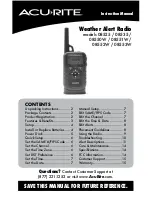
Copyright Information
Hytera is the trademark or registered trademark of
Hytera
Communications
Corporation
Limited
(the
Company) in the People's Republic of China (PRC) and/or
other countries or areas. The Company retains the
ownership of its trademarks and product names. All other
trademarks and/or product names that may be used in this
manual are properties of their respective owners.
The product described in this manual may include the
Company's computer programs stored in memory or other
media. Laws in PRC and/or other countries or areas
protect the exclusive rights of the Company with respect
to its computer programs. The purchase of this product
shall not be deemed to grant, either directly or by
implication, any rights to the purchaser regarding the
Company's computer programs. The Company's computer
programs may not be copied, modified, distributed,
decompiled, or reverse- engineered in any manner
without the prior written consent of the Company.
Disclaimer
The Company endeavors to achieve the accuracy and
completeness of this manual, but no warranty of accuracy
or reliability is given. All the specifications and designs
are subject to change without notice due to continuous
technological development. No part of this manual may
be copied, modified, translated, or distributed in any
manner without the prior written consent of the Company.
We do not guarantee, for any particular purpose, the
accuracy, validity, timeliness, legitimacy or completeness
of the third- party products and contents involved in this
manual.
If you have any suggestions or would like to receive more
information,
please
visit
our
website
at:
http://www.hytera.com.
RF Radiation Information
This product must be restricted to operations in an
occupational/controlled RF exposure environment. Users
must be fully aware of the hazards of the exposure and
able to exercise control over their RF exposure to qualify
for the higher exposure limits.
RF Radiation Profile
Radio Frequency (RF) is a frequency of electromagnetic
radiation in the range at which radio signals are
transmitted.
RF
technology
is
widely
used
in
communication, medicine, food processing and other
fields. It may generate radiation during use.
RF Radiation Safety
In order to ensure user health, experts from relevant
industries including science, engineering, medicine and
health work with international organizations to develop
standards for safe exposure to RF radiation. These
standards consist of:
l
United States Federal Communications Commission,
Code of Federal Regulations; 47CFR part 2 sub-part J;
l
American
National
Standards
Institute
(ANSI)/Institute
of
Electrical
and
Electronic
Engineers (IEEE) C95. 1-1992;
l
Institute of Electrical and Electronic Engineers
(IEEE) C95.1-1999;
l
International Commission on Non- Ionizing Radiation
Protection (ICNIRP) 1998.
FCC Statement
This equipment has been tested and found to comply with
the limits for a Class B digital device, pursuant to part 15
of FCC Rules. These limits are designed to provide
reasonable protection against harmful interference in a
residential installation. This equipment generates and can
radiate radio frequency energy and, if not installed and
used in accordance with the instructions, may cause
harmful interference to radio communications. However,
there is no guarantee that interference will not occur in a
particular installation. If this equipment does cause
harmful interference to radio or television reception,
which can be determined by turning the equipment off
and on, the user is encouraged to try to correct.
The interference by one or more of the following
measures:
l
Reorient or relocate the receiving antenna. Increase
the separation between the equipment and receiver.
l
Connect the equipment into an outlet on a circuit
different from that to which the
receiver
is
connected.
l
Consult the dealer or an experienced radio/TV
technician for help.
Operation is subject to the following two conditions: 1.
This device may not cause harmful interference, and 2.
This device must accept any interference received,
including
interference
that
may
cause
undesired
operation.
Note: Changes or modifications to this unit not expressly
approved by the party responsible for compliance could
void the user's authority to operate the equipment.
IC Statement




































